Food Policy and Public Health: Educator Wellness Plan
VerifiedAdded on 2022/10/31
|12
|2673
|310
Presentation
AI Summary
This presentation focuses on the crucial topic of educator wellness and wellbeing within early childhood settings, emphasizing the vital role educators play in children's development. It addresses the impact of workplace stress, lack of recognition, and underpayment on educators' wellbeing, highlighting potential negative consequences. The presentation proposes a comprehensive plan to improve staff wellness, including community support, stress management training, and recognition programs. It also explores the leadership roles in early childhood settings, detailing the responsibilities of team leaders, pedagogy creators, policy designers, and rights advocates. Furthermore, it outlines essential leadership skills for fostering educator wellbeing, emphasizing the development of strong relationships and ethical inquiry. The presentation concludes by underscoring the importance of holistic wellness and the positive impact of educator wellbeing on staff morale, productivity, and the overall learning environment.
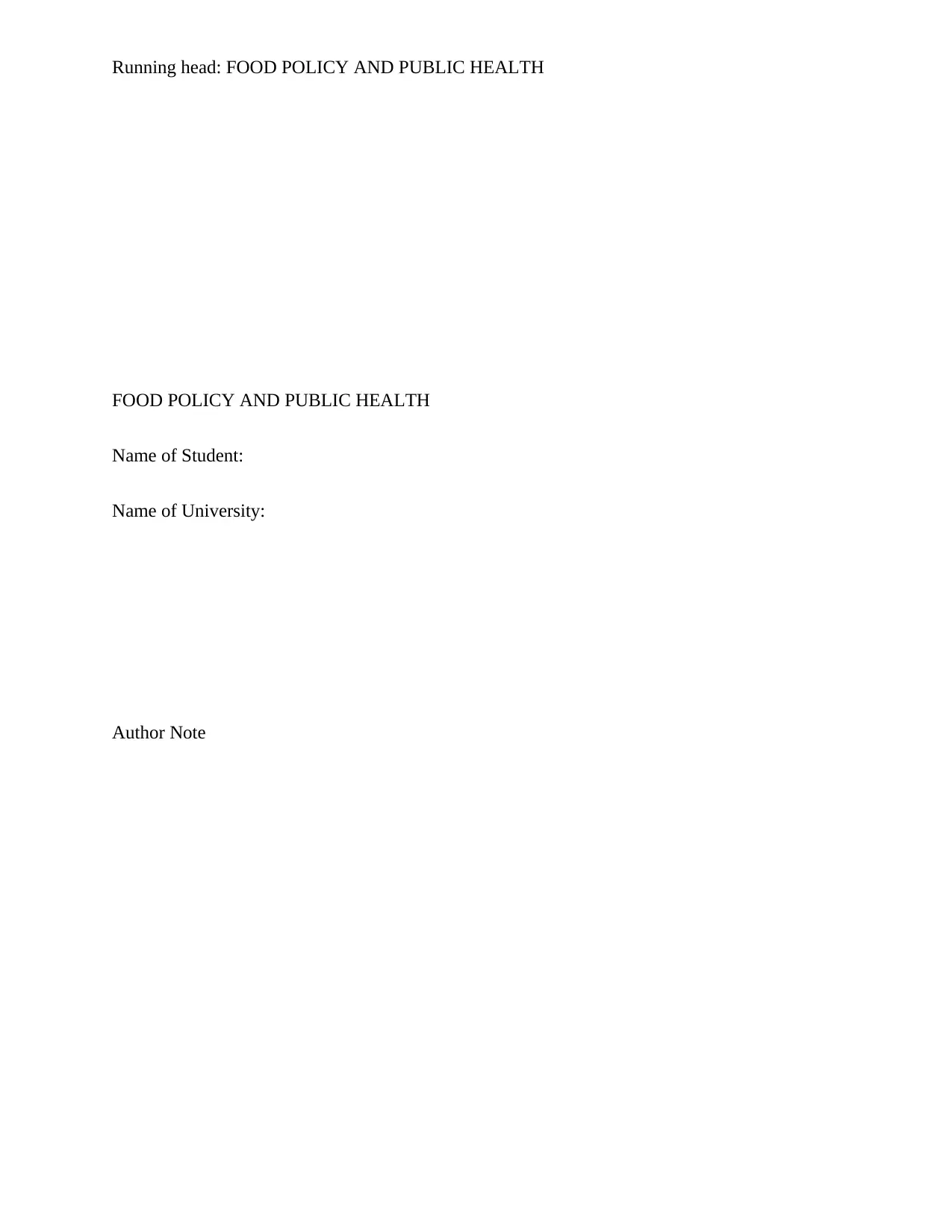
Running head: FOOD POLICY AND PUBLIC HEALTH
FOOD POLICY AND PUBLIC HEALTH
Name of Student:
Name of University:
Author Note
FOOD POLICY AND PUBLIC HEALTH
Name of Student:
Name of University:
Author Note
Paraphrase This Document
Need a fresh take? Get an instant paraphrase of this document with our AI Paraphraser
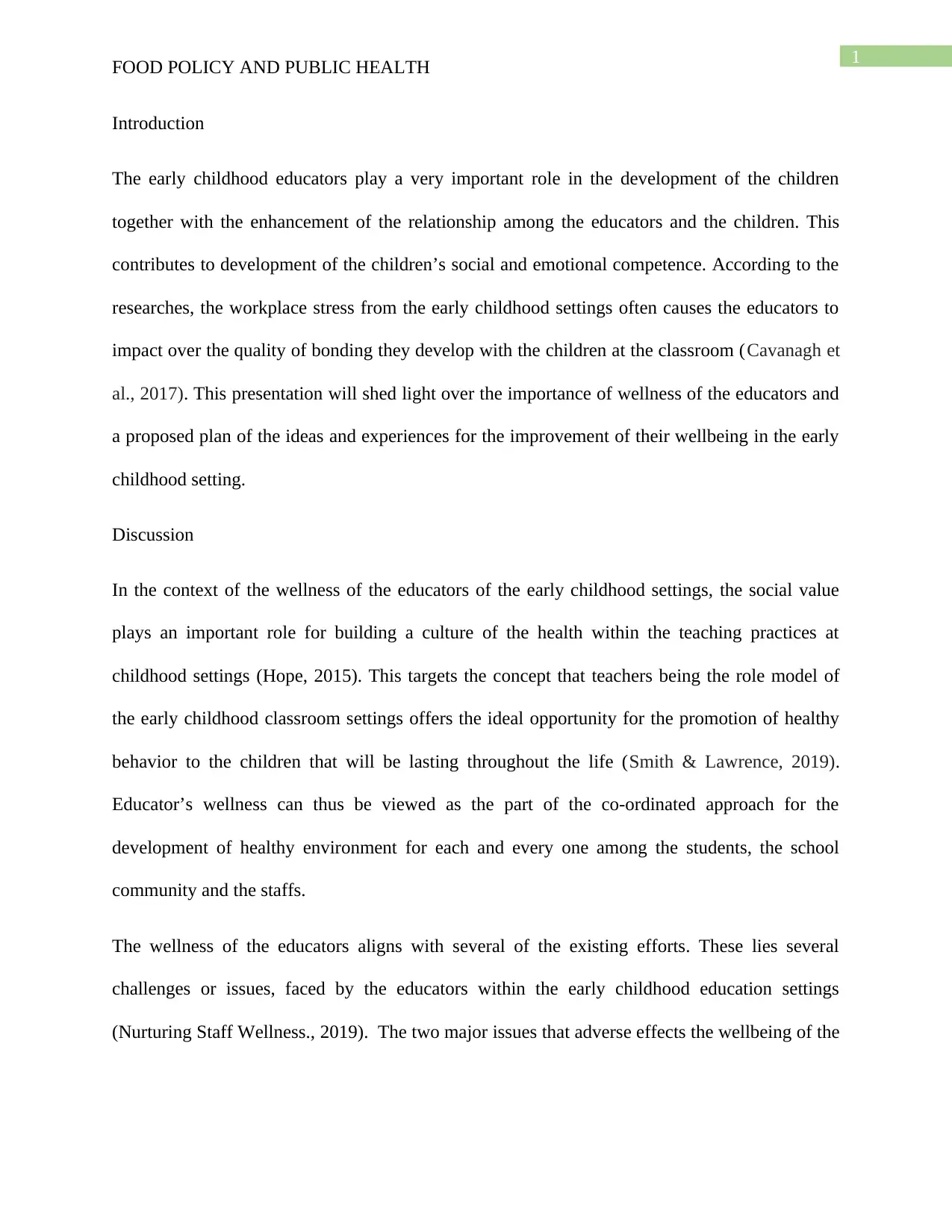
1
FOOD POLICY AND PUBLIC HEALTH
Introduction
The early childhood educators play a very important role in the development of the children
together with the enhancement of the relationship among the educators and the children. This
contributes to development of the children’s social and emotional competence. According to the
researches, the workplace stress from the early childhood settings often causes the educators to
impact over the quality of bonding they develop with the children at the classroom (Cavanagh et
al., 2017). This presentation will shed light over the importance of wellness of the educators and
a proposed plan of the ideas and experiences for the improvement of their wellbeing in the early
childhood setting.
Discussion
In the context of the wellness of the educators of the early childhood settings, the social value
plays an important role for building a culture of the health within the teaching practices at
childhood settings (Hope, 2015). This targets the concept that teachers being the role model of
the early childhood classroom settings offers the ideal opportunity for the promotion of healthy
behavior to the children that will be lasting throughout the life (Smith & Lawrence, 2019).
Educator’s wellness can thus be viewed as the part of the co-ordinated approach for the
development of healthy environment for each and every one among the students, the school
community and the staffs.
The wellness of the educators aligns with several of the existing efforts. These lies several
challenges or issues, faced by the educators within the early childhood education settings
(Nurturing Staff Wellness., 2019). The two major issues that adverse effects the wellbeing of the
FOOD POLICY AND PUBLIC HEALTH
Introduction
The early childhood educators play a very important role in the development of the children
together with the enhancement of the relationship among the educators and the children. This
contributes to development of the children’s social and emotional competence. According to the
researches, the workplace stress from the early childhood settings often causes the educators to
impact over the quality of bonding they develop with the children at the classroom (Cavanagh et
al., 2017). This presentation will shed light over the importance of wellness of the educators and
a proposed plan of the ideas and experiences for the improvement of their wellbeing in the early
childhood setting.
Discussion
In the context of the wellness of the educators of the early childhood settings, the social value
plays an important role for building a culture of the health within the teaching practices at
childhood settings (Hope, 2015). This targets the concept that teachers being the role model of
the early childhood classroom settings offers the ideal opportunity for the promotion of healthy
behavior to the children that will be lasting throughout the life (Smith & Lawrence, 2019).
Educator’s wellness can thus be viewed as the part of the co-ordinated approach for the
development of healthy environment for each and every one among the students, the school
community and the staffs.
The wellness of the educators aligns with several of the existing efforts. These lies several
challenges or issues, faced by the educators within the early childhood education settings
(Nurturing Staff Wellness., 2019). The two major issues that adverse effects the wellbeing of the
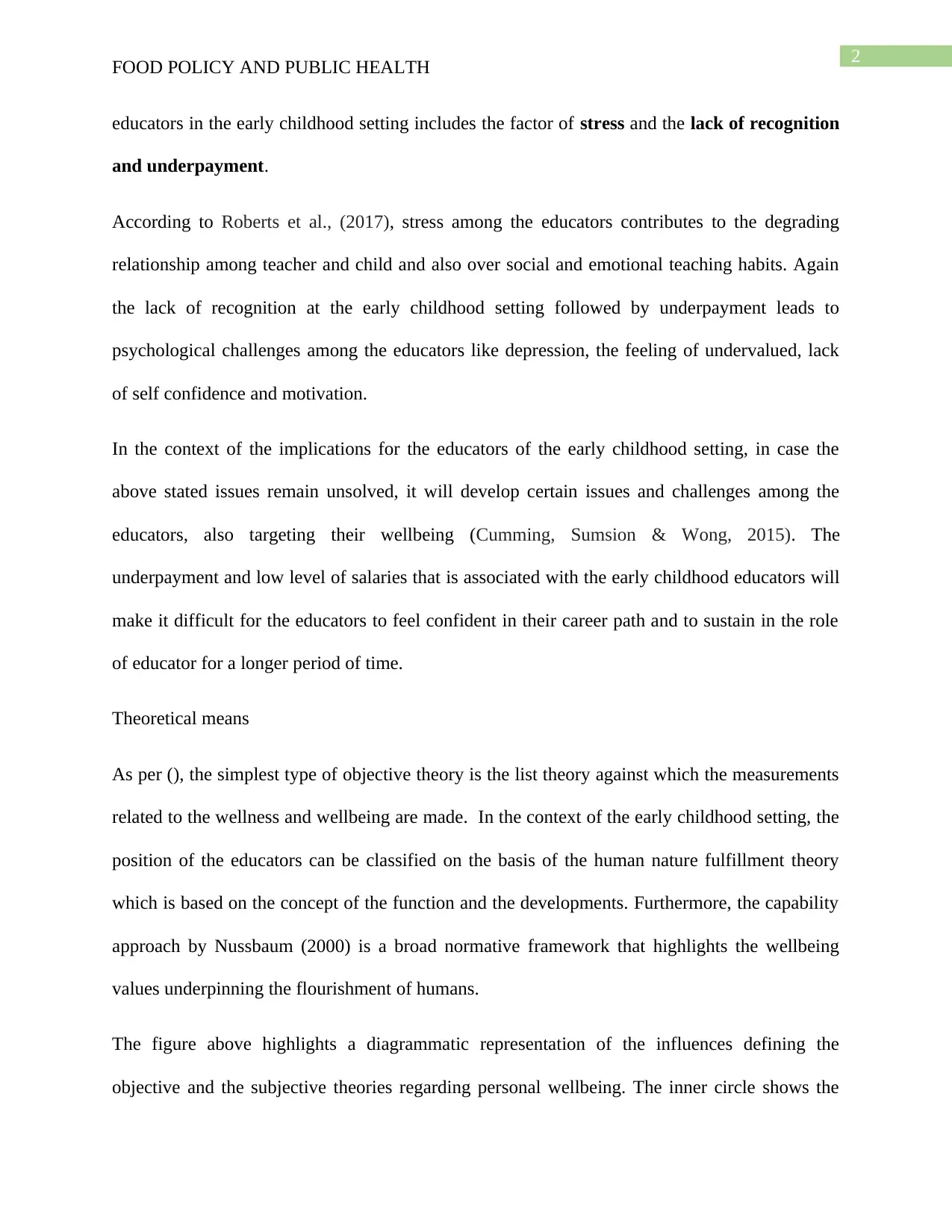
2
FOOD POLICY AND PUBLIC HEALTH
educators in the early childhood setting includes the factor of stress and the lack of recognition
and underpayment.
According to Roberts et al., (2017), stress among the educators contributes to the degrading
relationship among teacher and child and also over social and emotional teaching habits. Again
the lack of recognition at the early childhood setting followed by underpayment leads to
psychological challenges among the educators like depression, the feeling of undervalued, lack
of self confidence and motivation.
In the context of the implications for the educators of the early childhood setting, in case the
above stated issues remain unsolved, it will develop certain issues and challenges among the
educators, also targeting their wellbeing (Cumming, Sumsion & Wong, 2015). The
underpayment and low level of salaries that is associated with the early childhood educators will
make it difficult for the educators to feel confident in their career path and to sustain in the role
of educator for a longer period of time.
Theoretical means
As per (), the simplest type of objective theory is the list theory against which the measurements
related to the wellness and wellbeing are made. In the context of the early childhood setting, the
position of the educators can be classified on the basis of the human nature fulfillment theory
which is based on the concept of the function and the developments. Furthermore, the capability
approach by Nussbaum (2000) is a broad normative framework that highlights the wellbeing
values underpinning the flourishment of humans.
The figure above highlights a diagrammatic representation of the influences defining the
objective and the subjective theories regarding personal wellbeing. The inner circle shows the
FOOD POLICY AND PUBLIC HEALTH
educators in the early childhood setting includes the factor of stress and the lack of recognition
and underpayment.
According to Roberts et al., (2017), stress among the educators contributes to the degrading
relationship among teacher and child and also over social and emotional teaching habits. Again
the lack of recognition at the early childhood setting followed by underpayment leads to
psychological challenges among the educators like depression, the feeling of undervalued, lack
of self confidence and motivation.
In the context of the implications for the educators of the early childhood setting, in case the
above stated issues remain unsolved, it will develop certain issues and challenges among the
educators, also targeting their wellbeing (Cumming, Sumsion & Wong, 2015). The
underpayment and low level of salaries that is associated with the early childhood educators will
make it difficult for the educators to feel confident in their career path and to sustain in the role
of educator for a longer period of time.
Theoretical means
As per (), the simplest type of objective theory is the list theory against which the measurements
related to the wellness and wellbeing are made. In the context of the early childhood setting, the
position of the educators can be classified on the basis of the human nature fulfillment theory
which is based on the concept of the function and the developments. Furthermore, the capability
approach by Nussbaum (2000) is a broad normative framework that highlights the wellbeing
values underpinning the flourishment of humans.
The figure above highlights a diagrammatic representation of the influences defining the
objective and the subjective theories regarding personal wellbeing. The inner circle shows the
⊘ This is a preview!⊘
Do you want full access?
Subscribe today to unlock all pages.

Trusted by 1+ million students worldwide
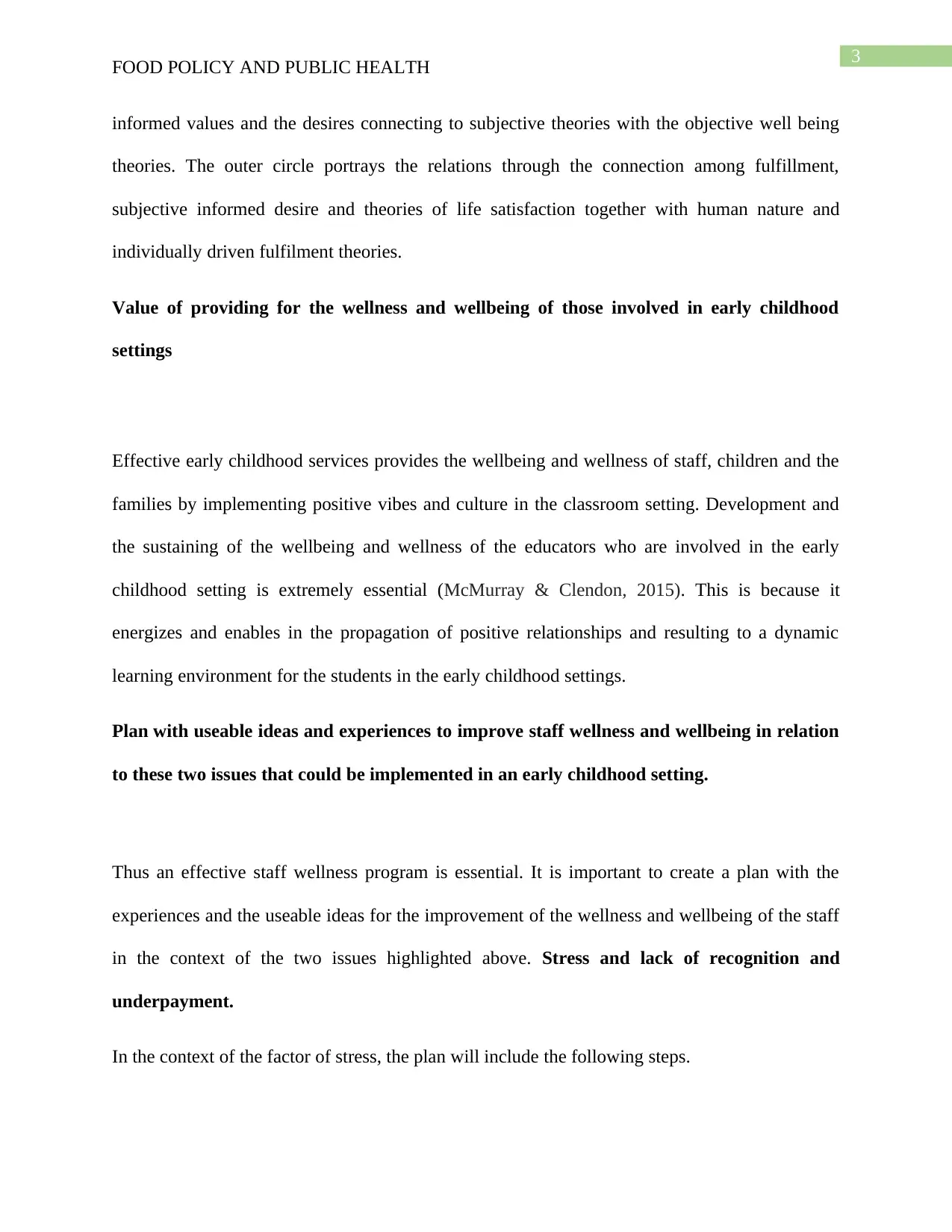
3
FOOD POLICY AND PUBLIC HEALTH
informed values and the desires connecting to subjective theories with the objective well being
theories. The outer circle portrays the relations through the connection among fulfillment,
subjective informed desire and theories of life satisfaction together with human nature and
individually driven fulfilment theories.
Value of providing for the wellness and wellbeing of those involved in early childhood
settings
Effective early childhood services provides the wellbeing and wellness of staff, children and the
families by implementing positive vibes and culture in the classroom setting. Development and
the sustaining of the wellbeing and wellness of the educators who are involved in the early
childhood setting is extremely essential (McMurray & Clendon, 2015). This is because it
energizes and enables in the propagation of positive relationships and resulting to a dynamic
learning environment for the students in the early childhood settings.
Plan with useable ideas and experiences to improve staff wellness and wellbeing in relation
to these two issues that could be implemented in an early childhood setting.
Thus an effective staff wellness program is essential. It is important to create a plan with the
experiences and the useable ideas for the improvement of the wellness and wellbeing of the staff
in the context of the two issues highlighted above. Stress and lack of recognition and
underpayment.
In the context of the factor of stress, the plan will include the following steps.
FOOD POLICY AND PUBLIC HEALTH
informed values and the desires connecting to subjective theories with the objective well being
theories. The outer circle portrays the relations through the connection among fulfillment,
subjective informed desire and theories of life satisfaction together with human nature and
individually driven fulfilment theories.
Value of providing for the wellness and wellbeing of those involved in early childhood
settings
Effective early childhood services provides the wellbeing and wellness of staff, children and the
families by implementing positive vibes and culture in the classroom setting. Development and
the sustaining of the wellbeing and wellness of the educators who are involved in the early
childhood setting is extremely essential (McMurray & Clendon, 2015). This is because it
energizes and enables in the propagation of positive relationships and resulting to a dynamic
learning environment for the students in the early childhood settings.
Plan with useable ideas and experiences to improve staff wellness and wellbeing in relation
to these two issues that could be implemented in an early childhood setting.
Thus an effective staff wellness program is essential. It is important to create a plan with the
experiences and the useable ideas for the improvement of the wellness and wellbeing of the staff
in the context of the two issues highlighted above. Stress and lack of recognition and
underpayment.
In the context of the factor of stress, the plan will include the following steps.
Paraphrase This Document
Need a fresh take? Get an instant paraphrase of this document with our AI Paraphraser
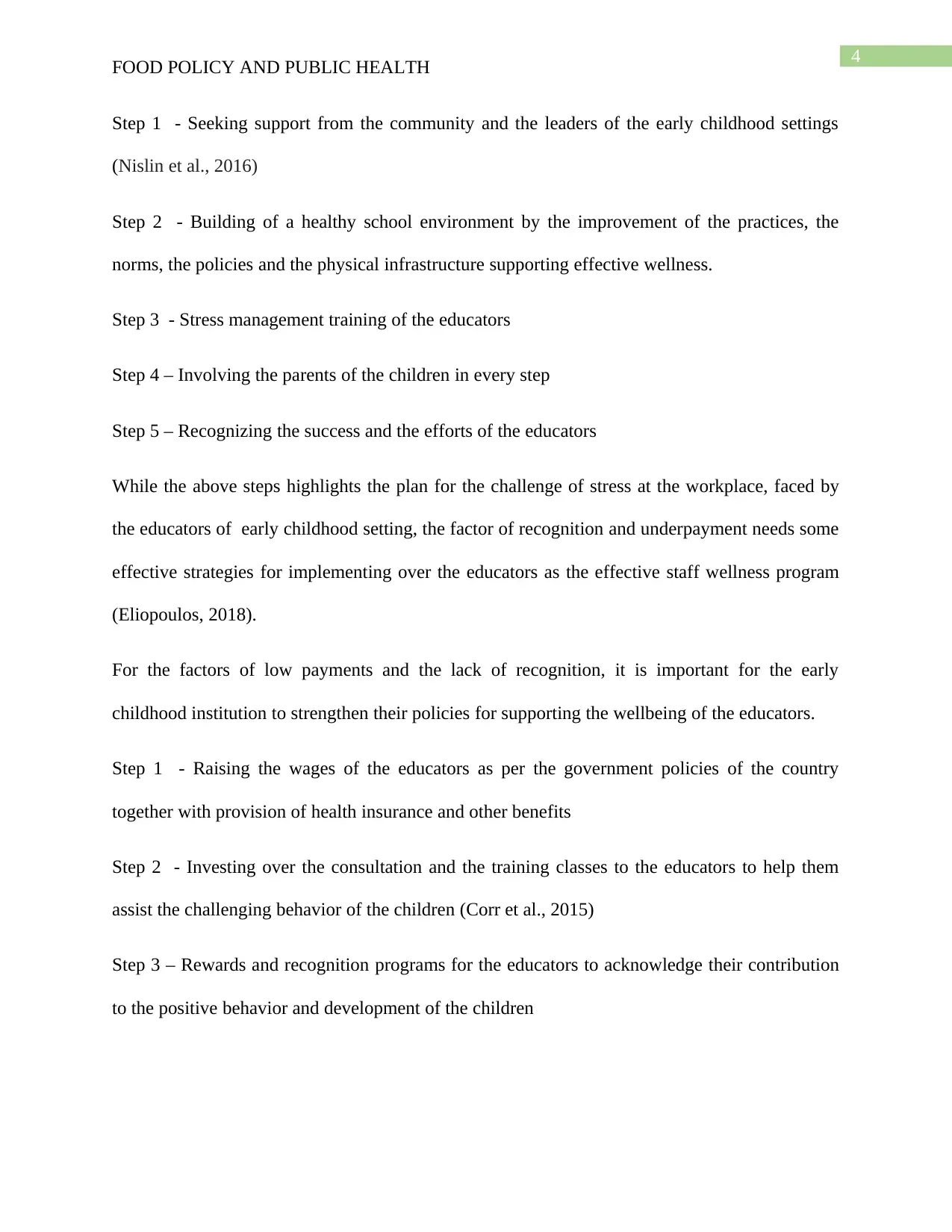
4
FOOD POLICY AND PUBLIC HEALTH
Step 1 - Seeking support from the community and the leaders of the early childhood settings
(Nislin et al., 2016)
Step 2 - Building of a healthy school environment by the improvement of the practices, the
norms, the policies and the physical infrastructure supporting effective wellness.
Step 3 - Stress management training of the educators
Step 4 – Involving the parents of the children in every step
Step 5 – Recognizing the success and the efforts of the educators
While the above steps highlights the plan for the challenge of stress at the workplace, faced by
the educators of early childhood setting, the factor of recognition and underpayment needs some
effective strategies for implementing over the educators as the effective staff wellness program
(Eliopoulos, 2018).
For the factors of low payments and the lack of recognition, it is important for the early
childhood institution to strengthen their policies for supporting the wellbeing of the educators.
Step 1 - Raising the wages of the educators as per the government policies of the country
together with provision of health insurance and other benefits
Step 2 - Investing over the consultation and the training classes to the educators to help them
assist the challenging behavior of the children (Corr et al., 2015)
Step 3 – Rewards and recognition programs for the educators to acknowledge their contribution
to the positive behavior and development of the children
FOOD POLICY AND PUBLIC HEALTH
Step 1 - Seeking support from the community and the leaders of the early childhood settings
(Nislin et al., 2016)
Step 2 - Building of a healthy school environment by the improvement of the practices, the
norms, the policies and the physical infrastructure supporting effective wellness.
Step 3 - Stress management training of the educators
Step 4 – Involving the parents of the children in every step
Step 5 – Recognizing the success and the efforts of the educators
While the above steps highlights the plan for the challenge of stress at the workplace, faced by
the educators of early childhood setting, the factor of recognition and underpayment needs some
effective strategies for implementing over the educators as the effective staff wellness program
(Eliopoulos, 2018).
For the factors of low payments and the lack of recognition, it is important for the early
childhood institution to strengthen their policies for supporting the wellbeing of the educators.
Step 1 - Raising the wages of the educators as per the government policies of the country
together with provision of health insurance and other benefits
Step 2 - Investing over the consultation and the training classes to the educators to help them
assist the challenging behavior of the children (Corr et al., 2015)
Step 3 – Rewards and recognition programs for the educators to acknowledge their contribution
to the positive behavior and development of the children
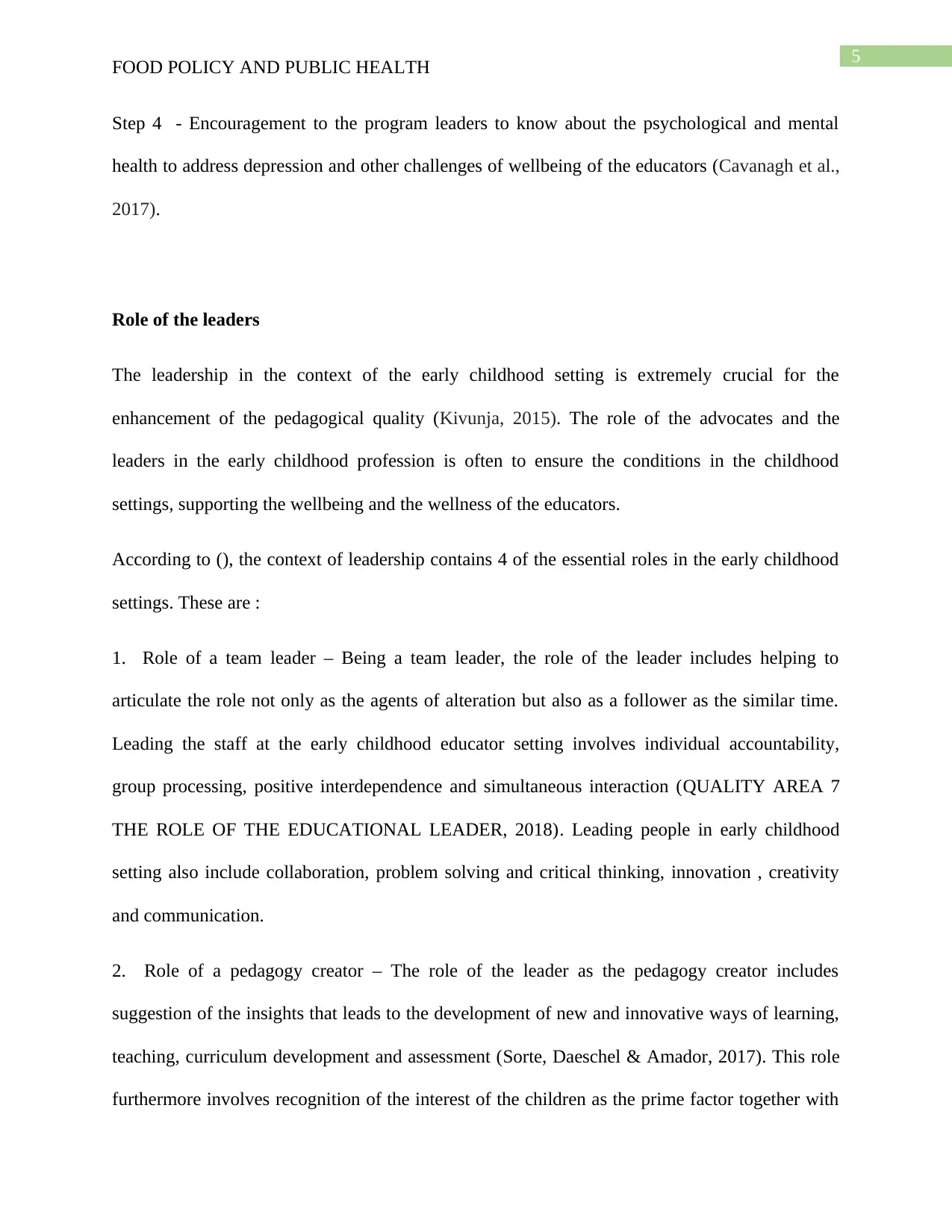
5
FOOD POLICY AND PUBLIC HEALTH
Step 4 - Encouragement to the program leaders to know about the psychological and mental
health to address depression and other challenges of wellbeing of the educators (Cavanagh et al.,
2017).
Role of the leaders
The leadership in the context of the early childhood setting is extremely crucial for the
enhancement of the pedagogical quality (Kivunja, 2015). The role of the advocates and the
leaders in the early childhood profession is often to ensure the conditions in the childhood
settings, supporting the wellbeing and the wellness of the educators.
According to (), the context of leadership contains 4 of the essential roles in the early childhood
settings. These are :
1. Role of a team leader – Being a team leader, the role of the leader includes helping to
articulate the role not only as the agents of alteration but also as a follower as the similar time.
Leading the staff at the early childhood educator setting involves individual accountability,
group processing, positive interdependence and simultaneous interaction (QUALITY AREA 7
THE ROLE OF THE EDUCATIONAL LEADER, 2018). Leading people in early childhood
setting also include collaboration, problem solving and critical thinking, innovation , creativity
and communication.
2. Role of a pedagogy creator – The role of the leader as the pedagogy creator includes
suggestion of the insights that leads to the development of new and innovative ways of learning,
teaching, curriculum development and assessment (Sorte, Daeschel & Amador, 2017). This role
furthermore involves recognition of the interest of the children as the prime factor together with
FOOD POLICY AND PUBLIC HEALTH
Step 4 - Encouragement to the program leaders to know about the psychological and mental
health to address depression and other challenges of wellbeing of the educators (Cavanagh et al.,
2017).
Role of the leaders
The leadership in the context of the early childhood setting is extremely crucial for the
enhancement of the pedagogical quality (Kivunja, 2015). The role of the advocates and the
leaders in the early childhood profession is often to ensure the conditions in the childhood
settings, supporting the wellbeing and the wellness of the educators.
According to (), the context of leadership contains 4 of the essential roles in the early childhood
settings. These are :
1. Role of a team leader – Being a team leader, the role of the leader includes helping to
articulate the role not only as the agents of alteration but also as a follower as the similar time.
Leading the staff at the early childhood educator setting involves individual accountability,
group processing, positive interdependence and simultaneous interaction (QUALITY AREA 7
THE ROLE OF THE EDUCATIONAL LEADER, 2018). Leading people in early childhood
setting also include collaboration, problem solving and critical thinking, innovation , creativity
and communication.
2. Role of a pedagogy creator – The role of the leader as the pedagogy creator includes
suggestion of the insights that leads to the development of new and innovative ways of learning,
teaching, curriculum development and assessment (Sorte, Daeschel & Amador, 2017). This role
furthermore involves recognition of the interest of the children as the prime factor together with
⊘ This is a preview!⊘
Do you want full access?
Subscribe today to unlock all pages.

Trusted by 1+ million students worldwide

6
FOOD POLICY AND PUBLIC HEALTH
interconnected peer earning networks that enhances opportunities for the development and the
utility of the digital fluency skills.
3. Role of a policy designer - At this stage, the role involves development of the vision for a
bigger picture in the early childhood setting. Leadership role requires the ability towards
creatively influence staff and children for engaging positively at educating, learning, teaching
together with growing up of the children (Eliopoulos, 2018). The leaders requires to have
determination to see proposed policies for being implemented correctly.
4. Role of a rights advocate – As the role of a rights advocate, the role requires to champion the
causes of the early childhood settings at several of the levels. The leaders need to advocate for
the success of the institution and also for the improvement on the conditions of working.
Early childhood leadership skills
The context of leadership in the early childhood care and education is a priority since it bridges
the high caliber leadership together with better outcomes for the young children (Sorte, Daeschel
& Amador, 2017). Some of the essential leadership skills in the context of the early childhood
leadership setting includes the following.
1. Developing the development, children’s learning and the wellbeing of the educator as the
prime focus
2. Development of the genuine and respectful relationships with communities and the
families (Smith and Lawrence, 2019)
FOOD POLICY AND PUBLIC HEALTH
interconnected peer earning networks that enhances opportunities for the development and the
utility of the digital fluency skills.
3. Role of a policy designer - At this stage, the role involves development of the vision for a
bigger picture in the early childhood setting. Leadership role requires the ability towards
creatively influence staff and children for engaging positively at educating, learning, teaching
together with growing up of the children (Eliopoulos, 2018). The leaders requires to have
determination to see proposed policies for being implemented correctly.
4. Role of a rights advocate – As the role of a rights advocate, the role requires to champion the
causes of the early childhood settings at several of the levels. The leaders need to advocate for
the success of the institution and also for the improvement on the conditions of working.
Early childhood leadership skills
The context of leadership in the early childhood care and education is a priority since it bridges
the high caliber leadership together with better outcomes for the young children (Sorte, Daeschel
& Amador, 2017). Some of the essential leadership skills in the context of the early childhood
leadership setting includes the following.
1. Developing the development, children’s learning and the wellbeing of the educator as the
prime focus
2. Development of the genuine and respectful relationships with communities and the
families (Smith and Lawrence, 2019)
Paraphrase This Document
Need a fresh take? Get an instant paraphrase of this document with our AI Paraphraser
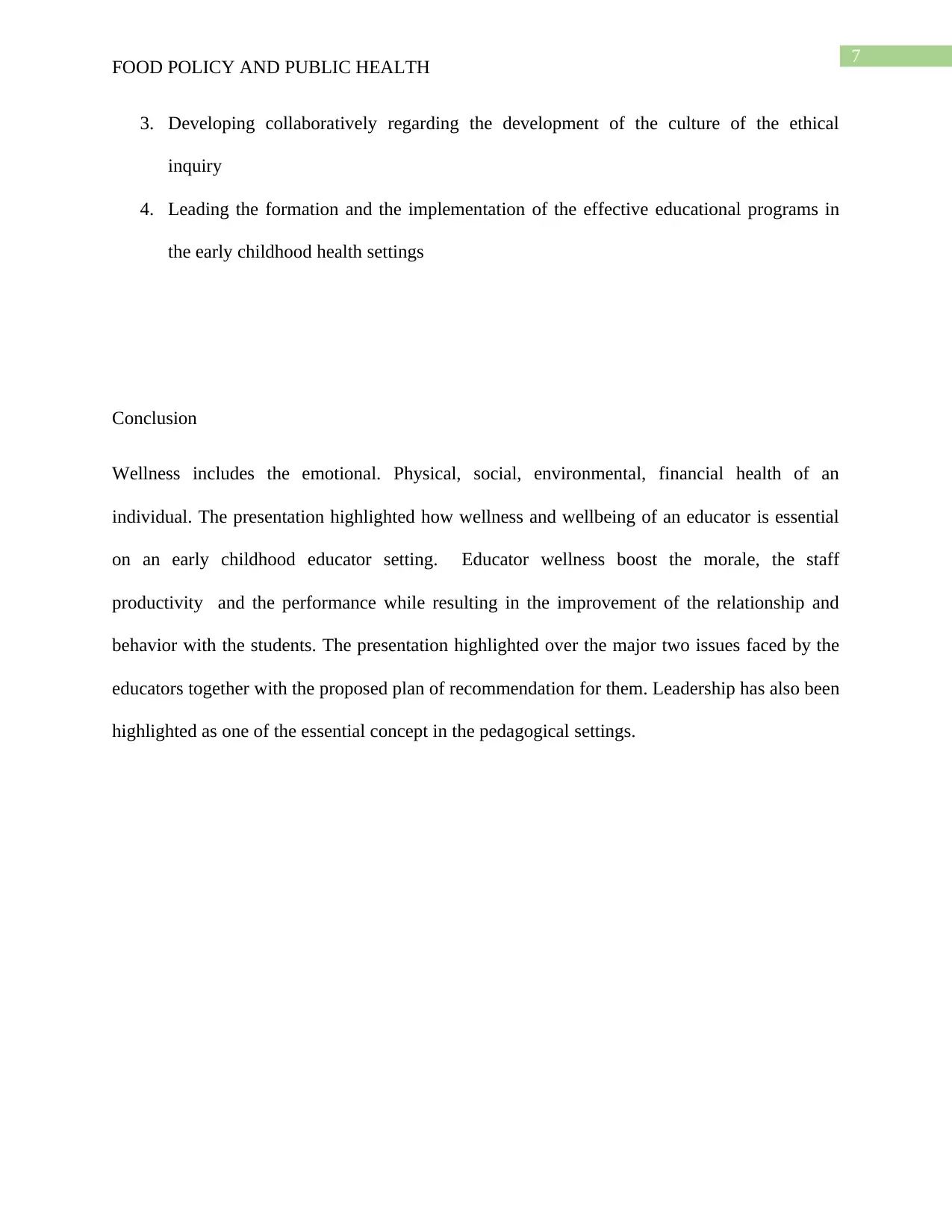
7
FOOD POLICY AND PUBLIC HEALTH
3. Developing collaboratively regarding the development of the culture of the ethical
inquiry
4. Leading the formation and the implementation of the effective educational programs in
the early childhood health settings
Conclusion
Wellness includes the emotional. Physical, social, environmental, financial health of an
individual. The presentation highlighted how wellness and wellbeing of an educator is essential
on an early childhood educator setting. Educator wellness boost the morale, the staff
productivity and the performance while resulting in the improvement of the relationship and
behavior with the students. The presentation highlighted over the major two issues faced by the
educators together with the proposed plan of recommendation for them. Leadership has also been
highlighted as one of the essential concept in the pedagogical settings.
FOOD POLICY AND PUBLIC HEALTH
3. Developing collaboratively regarding the development of the culture of the ethical
inquiry
4. Leading the formation and the implementation of the effective educational programs in
the early childhood health settings
Conclusion
Wellness includes the emotional. Physical, social, environmental, financial health of an
individual. The presentation highlighted how wellness and wellbeing of an educator is essential
on an early childhood educator setting. Educator wellness boost the morale, the staff
productivity and the performance while resulting in the improvement of the relationship and
behavior with the students. The presentation highlighted over the major two issues faced by the
educators together with the proposed plan of recommendation for them. Leadership has also been
highlighted as one of the essential concept in the pedagogical settings.
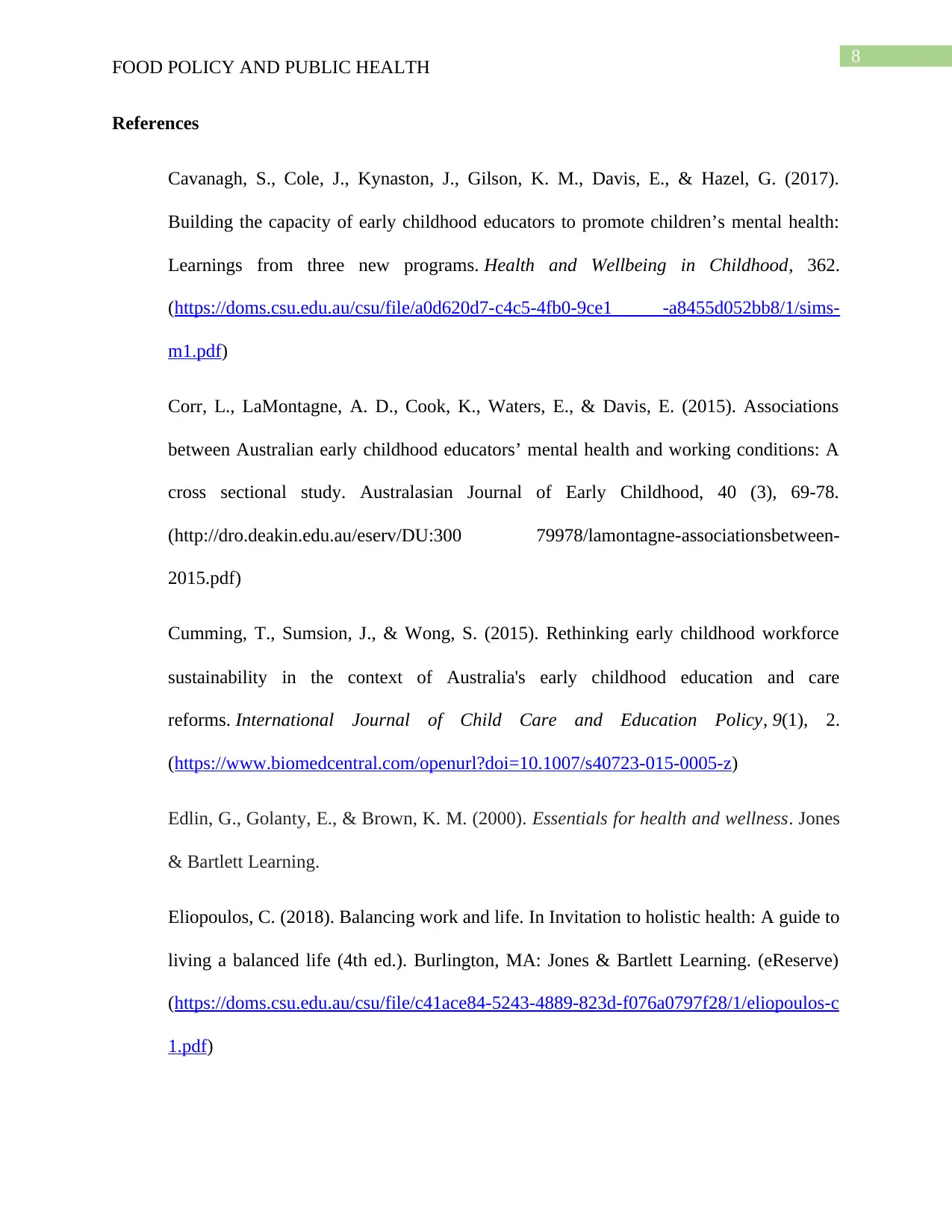
8
FOOD POLICY AND PUBLIC HEALTH
References
Cavanagh, S., Cole, J., Kynaston, J., Gilson, K. M., Davis, E., & Hazel, G. (2017).
Building the capacity of early childhood educators to promote children’s mental health:
Learnings from three new programs. Health and Wellbeing in Childhood, 362.
(https://doms.csu.edu.au/csu/file/a0d620d7-c4c5-4fb0-9ce1 -a8455d052bb8/1/sims-
m1.pdf)
Corr, L., LaMontagne, A. D., Cook, K., Waters, E., & Davis, E. (2015). Associations
between Australian early childhood educators’ mental health and working conditions: A
cross sectional study. Australasian Journal of Early Childhood, 40 (3), 69-78.
(http://dro.deakin.edu.au/eserv/DU:300 79978/lamontagne-associationsbetween-
2015.pdf)
Cumming, T., Sumsion, J., & Wong, S. (2015). Rethinking early childhood workforce
sustainability in the context of Australia's early childhood education and care
reforms. International Journal of Child Care and Education Policy, 9(1), 2.
(https://www.biomedcentral.com/openurl?doi=10.1007/s40723-015-0005-z)
Edlin, G., Golanty, E., & Brown, K. M. (2000). Essentials for health and wellness. Jones
& Bartlett Learning.
Eliopoulos, C. (2018). Balancing work and life. In Invitation to holistic health: A guide to
living a balanced life (4th ed.). Burlington, MA: Jones & Bartlett Learning. (eReserve)
(https://doms.csu.edu.au/csu/file/c41ace84-5243-4889-823d-f076a0797f28/1/eliopoulos-c
1.pdf)
FOOD POLICY AND PUBLIC HEALTH
References
Cavanagh, S., Cole, J., Kynaston, J., Gilson, K. M., Davis, E., & Hazel, G. (2017).
Building the capacity of early childhood educators to promote children’s mental health:
Learnings from three new programs. Health and Wellbeing in Childhood, 362.
(https://doms.csu.edu.au/csu/file/a0d620d7-c4c5-4fb0-9ce1 -a8455d052bb8/1/sims-
m1.pdf)
Corr, L., LaMontagne, A. D., Cook, K., Waters, E., & Davis, E. (2015). Associations
between Australian early childhood educators’ mental health and working conditions: A
cross sectional study. Australasian Journal of Early Childhood, 40 (3), 69-78.
(http://dro.deakin.edu.au/eserv/DU:300 79978/lamontagne-associationsbetween-
2015.pdf)
Cumming, T., Sumsion, J., & Wong, S. (2015). Rethinking early childhood workforce
sustainability in the context of Australia's early childhood education and care
reforms. International Journal of Child Care and Education Policy, 9(1), 2.
(https://www.biomedcentral.com/openurl?doi=10.1007/s40723-015-0005-z)
Edlin, G., Golanty, E., & Brown, K. M. (2000). Essentials for health and wellness. Jones
& Bartlett Learning.
Eliopoulos, C. (2018). Balancing work and life. In Invitation to holistic health: A guide to
living a balanced life (4th ed.). Burlington, MA: Jones & Bartlett Learning. (eReserve)
(https://doms.csu.edu.au/csu/file/c41ace84-5243-4889-823d-f076a0797f28/1/eliopoulos-c
1.pdf)
⊘ This is a preview!⊘
Do you want full access?
Subscribe today to unlock all pages.

Trusted by 1+ million students worldwide

9
FOOD POLICY AND PUBLIC HEALTH
Hope, K. (2015). Why is the health & wellbeing of early childhood educators important?
The Spoke: Early Childhood Australia’s Blog. Retrieved from
(http://thespoke.earlychildhoodaustralia.org.au/why-is-the-health-wellbe ing-of-early-
childhood-educators-important/)
Jennings, P. A. (2015). Early childhood teachers’ well-being, mindfulness, and self-
compassion in relation to classroom quality and attitudes towards challenging
students. Mindfulness, 6(4), 732-743.
(https://mindup.org/wp-content/uploads/2016/06/Jennings_Preschool-teachers-well-
being_Mindfulness_June-2014.pdf)
Jones, D. E., Greenberg, M., & Crowley, M. (2015). Early social-emotional functioning
and public health: The relationship between kindergarten social competence and future
wellness. American journal of public health, 105(11), 2283-2290.
(https://ajph.aphapublications.org/doi/pdfplus/10.2105/AJPH.2015.302630)
Kivunja, C. (2015). Leadership in early childhood education contexts: Looks, roles, and
functions. Creative Education, 6(16), 1710.
(https://www.researchgate.net/profile/Charles_Kivunja/publication/
282148494_Leadership_in_Early_Childhood_Education_Contexts_Looks_Roles_and_Fu
nctions/links/5604f79b08aeb5718ff02e5e.pdf)
McMurray, A., & Clendon, J. (2015). Community health and wellness-e-book: Primary
health care in practice. Elsevier Health Sciences. (https://books.google.co.in/books?
hl=en&lr=&id=C4-bBgAAQBAJ&oi=fnd&pg=PP1&dq=McMurray,+A.,+
%26+Clendon,+J.+(2015).+Community+health+and+wellness-e-book:
FOOD POLICY AND PUBLIC HEALTH
Hope, K. (2015). Why is the health & wellbeing of early childhood educators important?
The Spoke: Early Childhood Australia’s Blog. Retrieved from
(http://thespoke.earlychildhoodaustralia.org.au/why-is-the-health-wellbe ing-of-early-
childhood-educators-important/)
Jennings, P. A. (2015). Early childhood teachers’ well-being, mindfulness, and self-
compassion in relation to classroom quality and attitudes towards challenging
students. Mindfulness, 6(4), 732-743.
(https://mindup.org/wp-content/uploads/2016/06/Jennings_Preschool-teachers-well-
being_Mindfulness_June-2014.pdf)
Jones, D. E., Greenberg, M., & Crowley, M. (2015). Early social-emotional functioning
and public health: The relationship between kindergarten social competence and future
wellness. American journal of public health, 105(11), 2283-2290.
(https://ajph.aphapublications.org/doi/pdfplus/10.2105/AJPH.2015.302630)
Kivunja, C. (2015). Leadership in early childhood education contexts: Looks, roles, and
functions. Creative Education, 6(16), 1710.
(https://www.researchgate.net/profile/Charles_Kivunja/publication/
282148494_Leadership_in_Early_Childhood_Education_Contexts_Looks_Roles_and_Fu
nctions/links/5604f79b08aeb5718ff02e5e.pdf)
McMurray, A., & Clendon, J. (2015). Community health and wellness-e-book: Primary
health care in practice. Elsevier Health Sciences. (https://books.google.co.in/books?
hl=en&lr=&id=C4-bBgAAQBAJ&oi=fnd&pg=PP1&dq=McMurray,+A.,+
%26+Clendon,+J.+(2015).+Community+health+and+wellness-e-book:
Paraphrase This Document
Need a fresh take? Get an instant paraphrase of this document with our AI Paraphraser
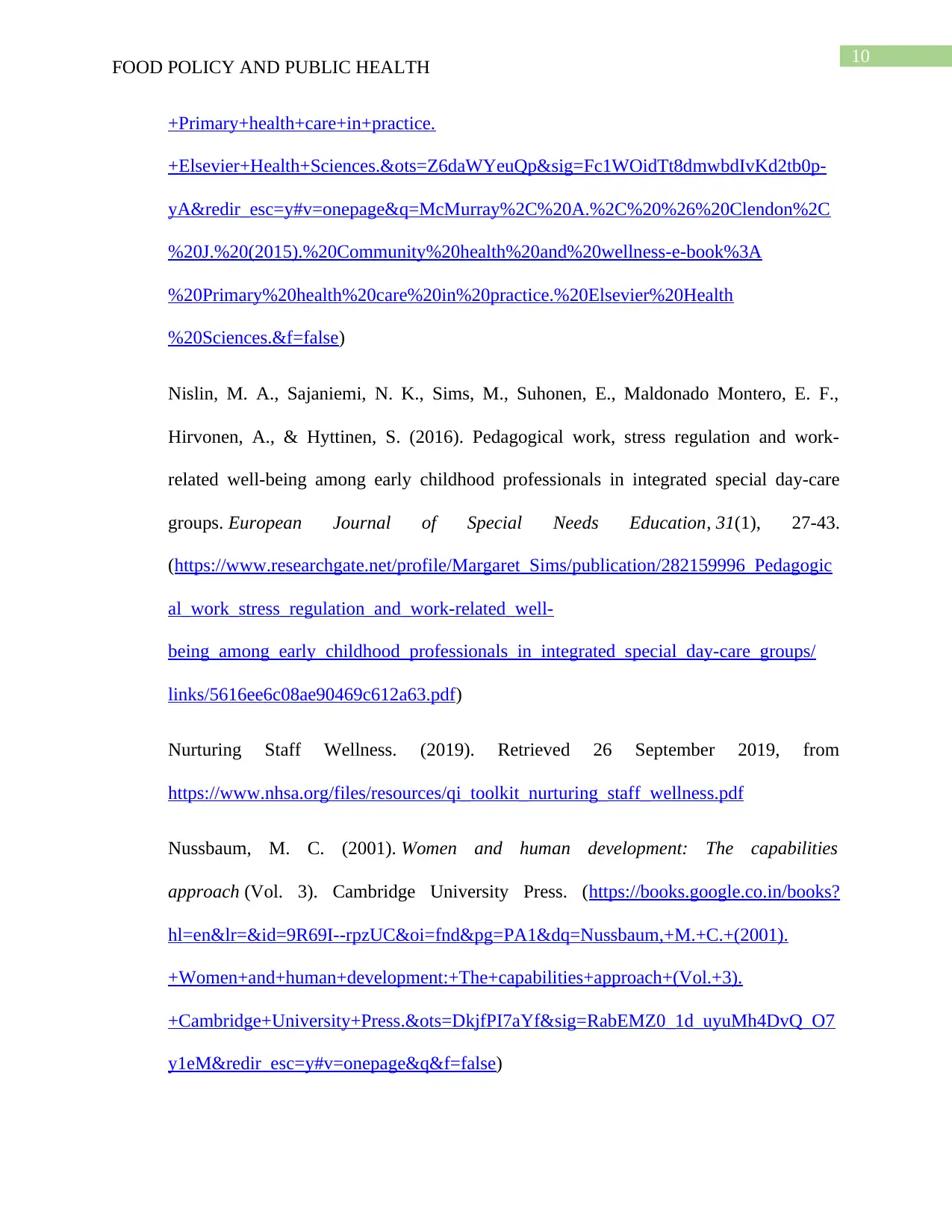
10
FOOD POLICY AND PUBLIC HEALTH
+Primary+health+care+in+practice.
+Elsevier+Health+Sciences.&ots=Z6daWYeuQp&sig=Fc1WOidTt8dmwbdIvKd2tb0p-
yA&redir_esc=y#v=onepage&q=McMurray%2C%20A.%2C%20%26%20Clendon%2C
%20J.%20(2015).%20Community%20health%20and%20wellness-e-book%3A
%20Primary%20health%20care%20in%20practice.%20Elsevier%20Health
%20Sciences.&f=false)
Nislin, M. A., Sajaniemi, N. K., Sims, M., Suhonen, E., Maldonado Montero, E. F.,
Hirvonen, A., & Hyttinen, S. (2016). Pedagogical work, stress regulation and work-
related well-being among early childhood professionals in integrated special day-care
groups. European Journal of Special Needs Education, 31(1), 27-43.
(https://www.researchgate.net/profile/Margaret_Sims/publication/282159996_Pedagogic
al_work_stress_regulation_and_work-related_well-
being_among_early_childhood_professionals_in_integrated_special_day-care_groups/
links/5616ee6c08ae90469c612a63.pdf)
Nurturing Staff Wellness. (2019). Retrieved 26 September 2019, from
https://www.nhsa.org/files/resources/qi_toolkit_nurturing_staff_wellness.pdf
Nussbaum, M. C. (2001). Women and human development: The capabilities
approach (Vol. 3). Cambridge University Press. (https://books.google.co.in/books?
hl=en&lr=&id=9R69I--rpzUC&oi=fnd&pg=PA1&dq=Nussbaum,+M.+C.+(2001).
+Women+and+human+development:+The+capabilities+approach+(Vol.+3).
+Cambridge+University+Press.&ots=DkjfPI7aYf&sig=RabEMZ0_1d_uyuMh4DvQ_O7
y1eM&redir_esc=y#v=onepage&q&f=false)
FOOD POLICY AND PUBLIC HEALTH
+Primary+health+care+in+practice.
+Elsevier+Health+Sciences.&ots=Z6daWYeuQp&sig=Fc1WOidTt8dmwbdIvKd2tb0p-
yA&redir_esc=y#v=onepage&q=McMurray%2C%20A.%2C%20%26%20Clendon%2C
%20J.%20(2015).%20Community%20health%20and%20wellness-e-book%3A
%20Primary%20health%20care%20in%20practice.%20Elsevier%20Health
%20Sciences.&f=false)
Nislin, M. A., Sajaniemi, N. K., Sims, M., Suhonen, E., Maldonado Montero, E. F.,
Hirvonen, A., & Hyttinen, S. (2016). Pedagogical work, stress regulation and work-
related well-being among early childhood professionals in integrated special day-care
groups. European Journal of Special Needs Education, 31(1), 27-43.
(https://www.researchgate.net/profile/Margaret_Sims/publication/282159996_Pedagogic
al_work_stress_regulation_and_work-related_well-
being_among_early_childhood_professionals_in_integrated_special_day-care_groups/
links/5616ee6c08ae90469c612a63.pdf)
Nurturing Staff Wellness. (2019). Retrieved 26 September 2019, from
https://www.nhsa.org/files/resources/qi_toolkit_nurturing_staff_wellness.pdf
Nussbaum, M. C. (2001). Women and human development: The capabilities
approach (Vol. 3). Cambridge University Press. (https://books.google.co.in/books?
hl=en&lr=&id=9R69I--rpzUC&oi=fnd&pg=PA1&dq=Nussbaum,+M.+C.+(2001).
+Women+and+human+development:+The+capabilities+approach+(Vol.+3).
+Cambridge+University+Press.&ots=DkjfPI7aYf&sig=RabEMZ0_1d_uyuMh4DvQ_O7
y1eM&redir_esc=y#v=onepage&q&f=false)
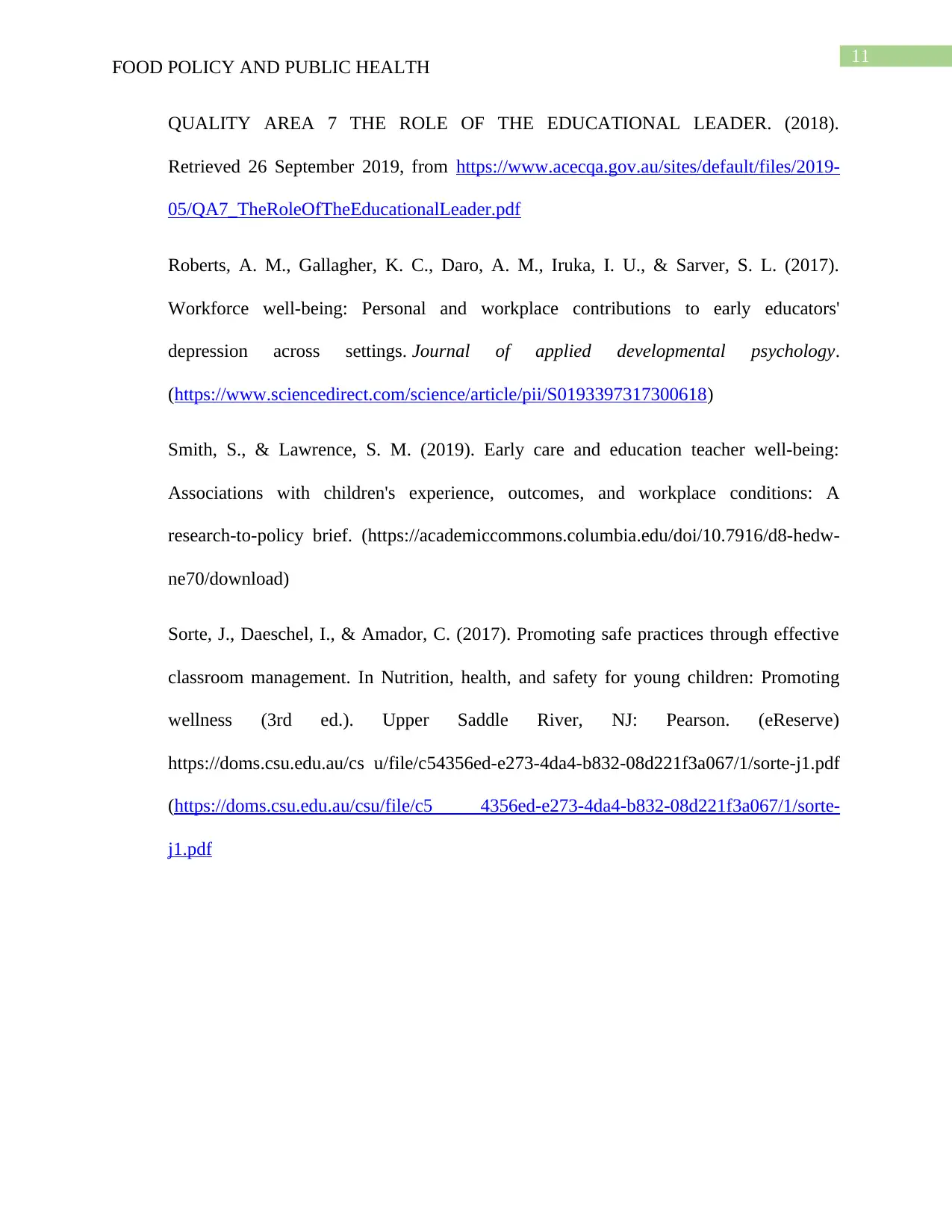
11
FOOD POLICY AND PUBLIC HEALTH
QUALITY AREA 7 THE ROLE OF THE EDUCATIONAL LEADER. (2018).
Retrieved 26 September 2019, from https://www.acecqa.gov.au/sites/default/files/2019-
05/QA7_TheRoleOfTheEducationalLeader.pdf
Roberts, A. M., Gallagher, K. C., Daro, A. M., Iruka, I. U., & Sarver, S. L. (2017).
Workforce well-being: Personal and workplace contributions to early educators'
depression across settings. Journal of applied developmental psychology.
(https://www.sciencedirect.com/science/article/pii/S0193397317300618)
Smith, S., & Lawrence, S. M. (2019). Early care and education teacher well-being:
Associations with children's experience, outcomes, and workplace conditions: A
research-to-policy brief. (https://academiccommons.columbia.edu/doi/10.7916/d8-hedw-
ne70/download)
Sorte, J., Daeschel, I., & Amador, C. (2017). Promoting safe practices through effective
classroom management. In Nutrition, health, and safety for young children: Promoting
wellness (3rd ed.). Upper Saddle River, NJ: Pearson. (eReserve)
https://doms.csu.edu.au/cs u/file/c54356ed-e273-4da4-b832-08d221f3a067/1/sorte-j1.pdf
(https://doms.csu.edu.au/csu/file/c5 4356ed-e273-4da4-b832-08d221f3a067/1/sorte-
j1.pdf
FOOD POLICY AND PUBLIC HEALTH
QUALITY AREA 7 THE ROLE OF THE EDUCATIONAL LEADER. (2018).
Retrieved 26 September 2019, from https://www.acecqa.gov.au/sites/default/files/2019-
05/QA7_TheRoleOfTheEducationalLeader.pdf
Roberts, A. M., Gallagher, K. C., Daro, A. M., Iruka, I. U., & Sarver, S. L. (2017).
Workforce well-being: Personal and workplace contributions to early educators'
depression across settings. Journal of applied developmental psychology.
(https://www.sciencedirect.com/science/article/pii/S0193397317300618)
Smith, S., & Lawrence, S. M. (2019). Early care and education teacher well-being:
Associations with children's experience, outcomes, and workplace conditions: A
research-to-policy brief. (https://academiccommons.columbia.edu/doi/10.7916/d8-hedw-
ne70/download)
Sorte, J., Daeschel, I., & Amador, C. (2017). Promoting safe practices through effective
classroom management. In Nutrition, health, and safety for young children: Promoting
wellness (3rd ed.). Upper Saddle River, NJ: Pearson. (eReserve)
https://doms.csu.edu.au/cs u/file/c54356ed-e273-4da4-b832-08d221f3a067/1/sorte-j1.pdf
(https://doms.csu.edu.au/csu/file/c5 4356ed-e273-4da4-b832-08d221f3a067/1/sorte-
j1.pdf
⊘ This is a preview!⊘
Do you want full access?
Subscribe today to unlock all pages.

Trusted by 1+ million students worldwide
1 out of 12
Related Documents
Your All-in-One AI-Powered Toolkit for Academic Success.
+13062052269
info@desklib.com
Available 24*7 on WhatsApp / Email
![[object Object]](/_next/static/media/star-bottom.7253800d.svg)
Unlock your academic potential
Copyright © 2020–2025 A2Z Services. All Rights Reserved. Developed and managed by ZUCOL.





